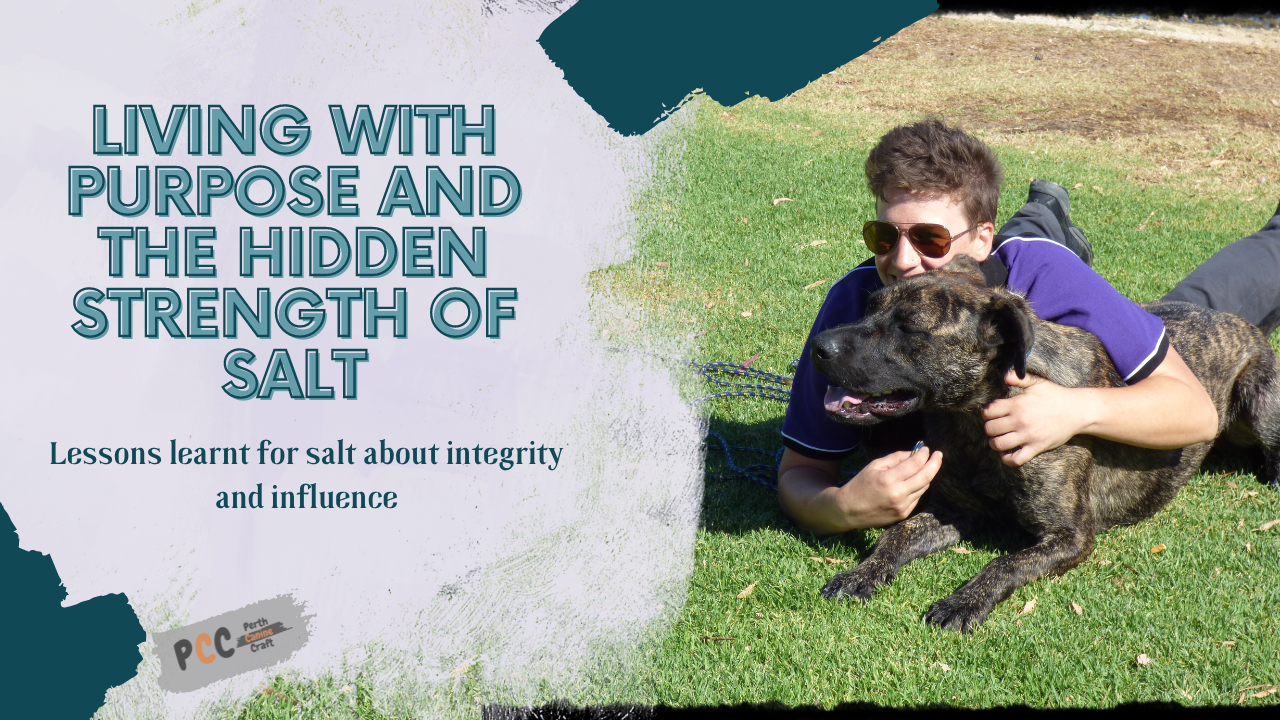The Significance of Salt: Lessons from the Bible
In our everyday lives, salt is a common but vital element. It preserves, enhances flavour, and even purifies. The Bible uses the metaphor of salt to convey profound spiritual and moral lessons, particularly through the proverb and parable of salt. Let’s explore these teachings and their implications for us today.
Personal Reflection
As a Christian, I believe that God was manifested in the flesh, came to live as a human to die for every sin ever committed. But the deal is that one has to accept that gift for it to be applied. Thus, I believe in a creator and follow His principles and values in all aspects of my life, including my work as a dog trainer. This belief system guides my actions and decisions, helping me adapt with integrity.
Matthew 5:13 (KJV): “Ye are the salt of the earth: but if the salt have lost his savour, wherewith shall it be salted? it is thenceforth good for nothing, but to be cast out, and to be trodden under foot of men.”
Here, Jesus uses salt as a metaphor for His followers, highlighting several key points:
Value and Preservation: In ancient times, salt was indispensable for preserving food and enhancing flavour. By calling His followers the “salt of the earth,” Jesus emphasizes their importance in bringing goodness, preserving morality, and enhancing the lives of those around them.
In the dog training world, I see discipline as salt. We use it in small amounts to bring goodness, preserving our relationships with our dogs and helping our dogs to live in our society. This principle is integral to my approach as a dog trainer.
Integrity and Influence: Just as salt is ineffective if it loses its flavour, a follower of Christ loses their effectiveness in making a positive impact if they compromise their principles. Maintaining one’s integrity is crucial to being a force for good in the world.
Maintaining integrity is crucial, which means that you have to be fair when you discipline your dog – to be fair, you have to be consistent. I know what it feels like when I received discipline in the form of correction, but over time it was inconsistent. Instead of feeling empowered because I knew how to avoid such correction, I felt like I was walking on eggshells because it was about the other person’s feelings, and I had no control over that.
This leads me to what abuse is. Being inconsistent with discipline is abuse, but being fair and consistent is actually helpful. It is hard for me to accept when people who disagree with using discipline for dogs use the legal system to put me in a position where I can’t help my dog via discipline and then might be forced to take drastic measures like putting my dog down. This is similar to the challenges faced by those I try to help.
The Parable of Salt: Commitment and Discipleship
Luke 14:34-35 (KJV): “Salt is good: but if the salt have lost his savour, wherewith shall it be seasoned? It is neither fit for the land, nor yet for the dunghill; but men cast it out. He that hath ears to hear, let him hear.”
This passage follows a discussion about the cost of discipleship, emphasizing that true disciples must be fully committed and maintain their distinctiveness to remain effective in their mission. Thus, it further expands on the theme of discipleship and commitment:

Discipleship: Jesus underscores the need for His followers to embrace their roles wholeheartedly. Just as unsalty salt is useless, a disciple who does not fully commit to the teachings and mission of Jesus cannot fulfil their purpose.
Being a disciple of Christ is simple but not easy. It looks different for every person and every season. Context matters, which is why Jesus taught us principles to adapt—not a rigid legalistic system. This adaptability is essential in my dog training practice, where each dog and owner have unique needs, so I have to be adaptable while still maintaining my values.
Commitment: The parable serves as a warning against half-hearted commitment. Believers are called to be fully engaged and dedicated to their spiritual journey and responsibilities.
You have to know your responsibilities to be committed. That’s where we start. Understanding and embracing our roles allows us to fully commit to our journey and make a meaningful impact. It is the same for dog ownership, you have to understand your responsibilities and sometimes that doesn’t happen until you are in the thick of it. My role is to help the human to understand and learn how to meet their responsibilities towards their dogs, but in a more realistic and practical fashion while keeping in mind their lifestyle, budget and their tribe.
Living as Salt of the Earth
The metaphor of salt encourages us to:
Live with Purpose: Actively influence our communities positively, upholding moral and spiritual values. Our actions should reflect our commitment to goodness and truth, making a meaningful difference in someone’s world (like those close to me – as scripture talks about ‘love thy neighbour as thyself’.
I do my best to live as a Christian, but I do that as a dog trainer with my motto “coaching both ends of the leash.” This purpose drives me to positively influence both dogs and their owners, but only those who ask for my help. I don’t go around giving unsolicited advice nor do can I force people to follow my suggestions.
Maintain Integrity: Stay true to our beliefs and commitments. Avoid actions that would dilute our effectiveness and witness. Our integrity is crucial to our ability to positively impact those around us.
I can adapt because the Bible is like an onion with many layers to peel away, ensuring it is applicable in real time and I do try to do the same with my clients. This depth of understanding helps me apply biblical principles in my daily life and work, maintaining my integrity and effectiveness.
As Christians, embodying the characteristics of salt means making a meaningful and lasting impact on the world. We are called to preserve, enhance, and purify, bringing the light of Christ into every corner of our lives. By living out these teachings, we fulfil our purpose and honour the calling to be the salt of the earth. The cool thing is, I don’t have to Bible-bash someone to help them and I am so glad I don’t have that pressure on me to do so either. I can help people find relief in a harsh world, but I can only do so because I have Christ in my life.
In a world that often loses its way, I strive to maintain my “saltiness,” ensuring that my live reflect the love, truth, and integrity that Jesus’s example call to uphold.





0 Comments